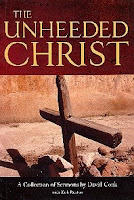Review: The Unheeded Christ
 I was recently handed a copy of David Cook’s The Unheeded Christ a collection of sermons published in 2006 through the Sydney Missionary & Bible College (SMBC) of which David is the principal. The sermons, taken from a semester’s sermon series, revolve around the “tough” teachings of Jesus – the difficult sayings, and the things that often go “unheeded.” The series begins with the Sermon on the Mount and then moves throughout the Gospel of Matthew to end with Matthew 28 and the Great Commission. There are thirteen sermons all told.
I was recently handed a copy of David Cook’s The Unheeded Christ a collection of sermons published in 2006 through the Sydney Missionary & Bible College (SMBC) of which David is the principal. The sermons, taken from a semester’s sermon series, revolve around the “tough” teachings of Jesus – the difficult sayings, and the things that often go “unheeded.” The series begins with the Sermon on the Mount and then moves throughout the Gospel of Matthew to end with Matthew 28 and the Great Commission. There are thirteen sermons all told.
The sermons are good technical homilies – well exegeted, well illustrated, and generally well applied. But, being sermons, the next question I ask of a book such as this is – “Was I impacted?” Did I learn something – but more than that – were these sermons the Word of God for me in the place I was in. Was I taught, rebuked, corrected, trained in righteousness etc.? (see 2 Tim 3:16).
In this case, I was impacted. The presentation of Christ in all his counter-cultural scandalous glory was a useful thing for me to encounter. And in particular I was impacted by Christ’s attitude towards opposition and persecution in the second talk “Do Not Resist (Matt 5:38-42).” I took to heart words such as:
“The only way to be detached from myself is to realise that now, I stand covered in the perfect righteousness of Christ. So if someone abuses me, if someone insults me, or slaps me, they are actually taking up arms against Christ himself. So the poise of my response will only come from trusting in the indwelling Christ, who has covered me with his righteousness.” (pp32-33)
A particular phrase Cook used to illustrate this point was “Eagles don’t catch flies.” Our eyes are on Christ and his purposes, not on petty retaliations or the distractions of this world. This impact is reiterated when the importance and method of conflict resolution is unpacked in “Resolving Tension (Matt 18:15-20).”
Something I wasn’t expecting was that together with a high view of the Bible there is within these sermons a high view of the church based on a solidarity with Christ. It is the basis for a number of his applications. Indeed, “… how we treat the disciples of Jesus is indicative of how we treat Jesus the Lord, himself.” (p182) I appreciated this emphasis.
These are sermons, preached at a Bible College. It would be interesting to see how a non-Christian or someone younger in the faith would be impacted by them. I don’t think that is of too greater concern however – it’s often the “older” Christians that have learned the bad habits of “dodging the bouncers” (p58) that are the difficult but life-giving words of Jesus, who often goes unheeded in our practice and purpose. It was good to get hit by a few when reading this book.



